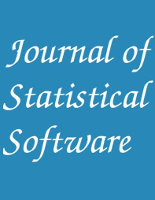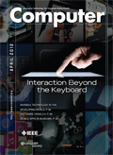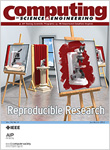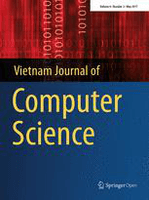
SoftwareX
Scope & Guideline
Elevating Software Research for Tomorrow's Challenges
Introduction
Aims and Scopes
- Software Development and Optimization:
Focuses on the creation of new software tools and libraries, as well as enhancements to existing ones, aimed at improving performance, usability, and applicability in various scientific fields. - Data Analysis and Visualization:
Includes tools and methodologies for analyzing, processing, and visualizing complex datasets, which are crucial for extracting meaningful insights from research data. - Interdisciplinary Applications:
Encourages contributions that span multiple scientific disciplines, highlighting software's role in addressing complex problems that require interdisciplinary approaches. - Open Source and Reproducibility:
Promotes open-source software solutions that enhance reproducibility and transparency in research, allowing wider access and collaboration among researchers. - Machine Learning and AI Implementations:
Explores the integration of machine learning and artificial intelligence techniques into software tools for predictive modeling, automation, and advanced data processing.
Trending and Emerging
- Cloud Computing and Distributed Systems:
An increasing number of publications focus on cloud-based solutions and distributed computing frameworks, addressing the need for scalable and efficient processing of large datasets. - Integration of AI and Machine Learning:
There is a significant rise in software tools that incorporate AI and machine learning techniques, reflecting the growing demand for intelligent systems capable of handling complex tasks. - Data Sharing and Collaboration Tools:
Emerging themes include software that facilitates data sharing, collaboration, and interoperability among researchers, supporting the open science movement. - Real-Time Data Processing and Analysis:
Software tools designed for real-time data processing, especially in fields like environmental monitoring and health informatics, are gaining prominence, driven by the need for timely decision-making. - User-Centric Design in Software Development:
A trend towards user-friendly interfaces and accessibility in software design is becoming more pronounced, ensuring that tools are usable by a broader audience, including non-experts.
Declining or Waning
- Traditional Statistical Methods:
There has been a noticeable decline in the publication of papers focusing solely on traditional statistical methodologies, as the field shifts towards more complex and computationally intensive machine learning approaches. - Standalone Software Solutions:
The trend is moving away from isolated software applications towards integrated platforms that offer comprehensive solutions, leading to fewer standalone tools being published. - Domain-Specific Tools:
There is a waning interest in software that is narrowly tailored to specific fields or applications, as researchers increasingly seek more universal tools that can be adapted for various uses.
Similar Journals

Jordanian Journal of Computers and Information Technology
Unveiling New Horizons in Information SystemsJordanian Journal of Computers and Information Technology, published by Princess Sumaya University and SRSF, stands as a significant platform for scholarly research in the realm of computer science, particularly in topics related to emerging technologies and information systems. With its Open Access model initiated in 2015, the journal facilitates global access to high-quality research findings, embodying the principles of knowledge sharing and academic collaboration. The journal's ranking in the Q3 category of Computer Science (miscellaneous) and its placement in the 54th percentile of Scopus' General Computer Science rankings underscore its growing reputation among researchers and professionals alike. Situated in Amman, Jordan, the journal actively contributes to the regional and international discourse on computing methodologies, applications, and innovations, making it an indispensable resource for scholars seeking to advance their understanding and engage with contemporary issues in technology.

Journal of Statistical Software
Exploring the frontiers of statistical methodologies and applications.Journal of Statistical Software, published by the esteemed Journal Statistical Software, stands as a premier platform for the dissemination of cutting-edge research in the fields of statistical software development, methodologies, and applications. With an impressive impact factor and consistently ranking in the Q1 quartile for Software, Statistics and Probability, and Statistics, Probability and Uncertainty as of 2023, this journal is recognized globally for its scholarly contributions and innovative content. The journal has been an Open Access publication since 1996, facilitating unrestricted access to high-quality research for a diverse audience, including researchers, professionals, and students. As the journal converges into its 28th volume in 2024, it continues to maintain a strong presence in key academic rankings—evidenced by its stellar Scopus rank, where it is placed in the top 5% of journals in its field. Located at UCLA Department of Statistics, in Los Angeles, this journal is dedicated to fostering the advancement of statistical software and its role in enhancing scientific research across multiple disciplines.

COMPUTER
Transforming Ideas into Impactful Research in Computer Science.COMPUTER, published by the IEEE COMPUTER SOC, stands as a pivotal resource in the field of computer science, encompassing a broad range of topics and innovations within the industry. With an ISSN of 0018-9162 and E-ISSN 1558-0814, this esteemed journal features high-impact research articles that contribute significantly to the advancement of technology, demonstrating a prestigious Q1 classification in the Computer Science (miscellaneous) category for 2023. Positioned within the top percentile of Scopus rankings (ranked #84 out of 232), COMPUTER serves as an essential platform for sharing pioneering ideas and emerging trends that shape the future of computing. Although it does not currently offer open access, the journal's rigorous peer-review process ensures the publication of high-quality content. Researchers, professionals, and students alike will find invaluable insights into computer science developments from 1970 through 2024, making it a vital tool for anyone dedicated to this ever-evolving field.

PeerJ Computer Science
Catalyzing Research Excellence in Computer SciencePeerJ Computer Science is a leading open access journal published by PEERJ INC, dedicated to the field of computer science. Since its inception in 2015, it has made significant strides in promoting scholarly communication and accessibility to cutting-edge research. With an impressive impact factor reflected by a Q1 ranking in the Computer Science (miscellaneous) category and a Scopus rank of 51 out of 232, this journal stands at the forefront of its field. The journal's open access model ensures that groundbreaking findings are readily available to researchers, professionals, and students alike, fostering collaboration and innovation in the ever-evolving landscape of computer science. As it continues to publish until 2024 and beyond, PeerJ Computer Science remains an essential resource for those seeking to stay ahead in their research and practice.

Nature Machine Intelligence
Navigating the Future of Computer Vision and AINature Machine Intelligence, published by NATURE PORTFOLIO, is an esteemed academic journal that significantly contributes to the fields of Artificial Intelligence, Computer Vision, Human-Computer Interaction, and Software Engineering. Launched in 2019, this journal has swiftly ascended to prominence, holding Q1 status across multiple categories in the 2023 Scopus rankings, highlighting its rigorous peer-review process and high-quality research output. With an impressive 99th percentile ranking in key area categories such as Computer Networks and Communications, it has established itself as a vital platform for disseminating innovative research and fostering scientific dialogue among scholars and professionals. Although the journal is not open access, it provides a wealth of information to its audience, making it essential for those engaged in cutting-edge research and development. Academic institutions, researchers, and industry professionals can rely on Nature Machine Intelligence for the latest advances and methodologies in artificial intelligence-driven technologies.

NEW GENERATION COMPUTING
Pioneering Research in Hardware and Software EngineeringNEW GENERATION COMPUTING is a prominent academic journal published by SPRINGER, specializing in the dynamic fields of Computer Networks, Hardware and Architecture, Software Engineering, and Theoretical Computer Science. With a commitment to disseminating high-quality research since its inception in 1983 and extending its coverage to 2024, this journal occupies a vital role in advancing knowledge and innovation within these critical domains. Holding prestigious Q2 rankings in Computer Networks and Communications, Hardware and Architecture, and Software, as well as a Q3 ranking in Theoretical Computer Science for 2023, NEW GENERATION COMPUTING attracts significant contributions from scholars and professionals around the globe. Researchers will find its rigorous peer-review process ensures the publication of impactful studies, while students gain access to cutting-edge research that shapes contemporary computing practices. Though it does not offer open access, the journal remains an invaluable resource in the academic community, fostering collaboration and dialogue among experts aiming to push the boundaries of technology.

Journal of Computer Science & Technology
Unveiling groundbreaking discoveries in software development.The Journal of Computer Science & Technology, published by UNIV NAC LA PLATA, FAC INFORMATICA, serves as a vital platform for disseminating high-quality research in the expansive fields of computer science, including but not limited to Artificial Intelligence, Computer Science Applications, Computer Vision, and Software Development. Since its inception in 1999, this Open Access journal has prioritized accessibility, ensuring that groundbreaking research from Argentina and beyond reaches a global audience of scholars, practitioners, and students alike. With a broad spectrum of articles indexed in Scopus, the journal operates within the Q3 quartile across various categories, reflecting its commitment to evolving scholarship in the technology domain. Researchers interested in advancing their knowledge and contributing to the field will find the journal an essential resource for contemporary discussions and developments in computer science.

COMPUTING IN SCIENCE & ENGINEERING
Empowering Innovation Through Collaborative Research.COMPUTING IN SCIENCE & ENGINEERING, published by the IEEE Computer Society, is a leading journal dedicated to bridging the gap between computing principles and practical applications in the realms of science and engineering. With an impact factor that reflects its strong reputation, this journal is essential for researchers, professionals, and students seeking to explore the latest developments as well as interdisciplinary collaborations in computing. Since its inception in 1999, the journal has undergone many transformations to remain at the forefront of innovation, with a converged publication range extending through 2024. It is categorized in the Q2 quartiles for both Computer Science and Engineering, demonstrating its significance in these fields, as evidenced by its Scopus rankings, placing it in the top 30% of general engineering and computer science journals. As part of the open-access movement, readers are encouraged to engage with cutting-edge research, fostering a deeper understanding and application of computing in various scientific disciplines. Discover the latest findings and contribute to advancing knowledge in this dynamic and critical area of study.

Vietnam Journal of Computer Science
Connecting scholars and professionals in the realm of computer science.Vietnam Journal of Computer Science, published by World Scientific Publishing Co Pte Ltd, serves as a prominent platform for researchers and professionals in the rapidly evolving field of computer science. Launched as an Open Access journal in 2013, it aims to disseminate high-quality research across various subfields, including Artificial Intelligence, Computational Theory and Mathematics, Computer Vision, and Information Systems. With its ISSN 2196-8888 and E-ISSN 2196-8896, the journal provides valuable insights and contributes to the growing body of knowledge in computer science, particularly in Southeast Asia. Despite its relatively recent establishment, the journal has achieved significant rankings, including Q3 status in multiple categories and notable visibility in Scopus metrics, evidencing its commitment to fostering innovative research. This journal is essential for those looking to stay at the forefront of computational advancements and applications, particularly in Vietnam and beyond, facilitating an engaging dialogue among scholars and industry professionals.

JOURNAL OF EXPERIMENTAL & THEORETICAL ARTIFICIAL INTELLIGENCE
Innovating the Future of Theoretical and Experimental AIThe Journal of Experimental & Theoretical Artificial Intelligence, published by Taylor & Francis Ltd, serves as a premier platform for researchers and professionals interested in advancing the fields of artificial intelligence, software engineering, and theoretical computer science. Established in 1989, this peer-reviewed journal features original research and comprehensive reviews that explore innovative methodologies and emerging trends within these dynamic domains. With an impact factor that reflects its relevance, the journal currently ranks in Q3 across its categories, affirming its contributions to the scholarly community. The journal's commitment to quality and rigor invites submissions that bridge experimental and theoretical frameworks, thus fostering a deeper understanding of AI's applications and implications. Researchers and students can access insightful articles that drive critical discussions and inspire future work, making this journal an essential resource for anyone looking to delve into the complexities of artificial intelligence and its surrounding disciplines.